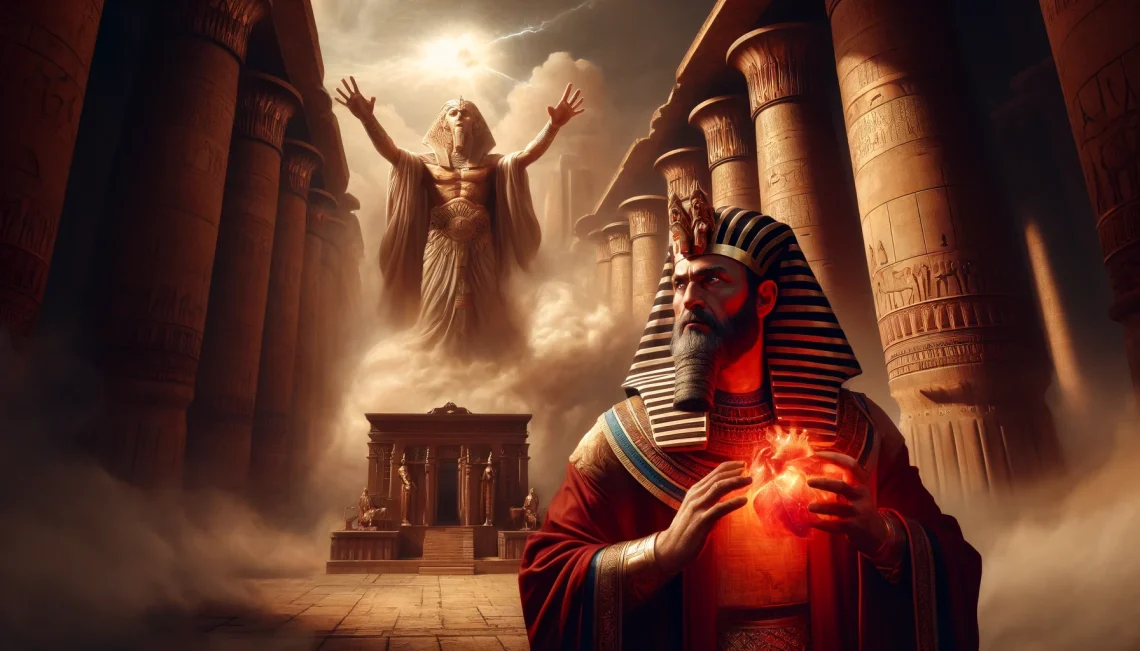In the book of Exodus, Moses and Aaron visit Egypt’s Pharaoh on behalf of the Israelites, asking him to let God’s people go free from slavery. Despite repeated requests, Pharaoh says no and even punishes the Israelites for their demands (Exodus 5:6–9). As a result, God sends 10 plagues on Egypt. After each of the first five plagues, Pharaoh’s heart “became hard” or he “hardened his own heart.” Then, in plagues 6–10, the pattern shifts; four of the last five times, the author of Exodus—likely Moses—notes that God hardened Pharaoh’s heart. Seems counterintuitive, right?
As Pharaoh ruled over God’s chosen people, it became clear that he harbored evil intent toward the Israelites. He could’ve saved his own people from the plagues by letting the Israelites go, but instead, he questioned, “Who is the LORD, that I should obey his voice and let Israel go? I do not know the LORD, and moreover, I will not let Israel go.”
The ensuing chapters depict the result of Pharaoh’s stubborn refusal to acknowledge God. All of Egypt’s water turned to blood; the nation was plagued with frogs, gnats, and flies; even the livestock of every Egyptian died while the Israelites’ livestock remained unharmed. This wasn’t enough for Pharaoh to heed God’s voice. It shows that Pharaoh had reached a point of no return.
For a quick rundown, here’s a list from the Bible Project showing the wording after each of the 10 plagues:
- Blood: Pharaoh’s heart “became hard” (Exodus 7:22)
- Frogs: Pharaoh “hardened his own heart” (Exodus 8:15)
- Gnats: Pharaoh’s heart “was hard” (Exodus 8:19)
- Flies: “Pharaoh hardened his own heart” (Exodus 8:32)
- Livestock die: Pharaoh’s heart “was hard” (Exodus 9:7)
- Boils: “The Lord hardened Pharaoh’s heart” (Exodus 9:12)
- Hail: Pharaoh “hardened his own heart” (Exodus 9:34)
- Locusts: God announces that he has “hardened Pharaoh’s heart” (Exodus 10:1, 10:20)
- Darkness: God “hardened Pharaoh’s heart” (Exodus 10:27)
- Death of the firstborn: God “hardened Pharaoh’s heart” (Exodus 11:10)
With each plague listed for reference, let’s analyze this section of Exodus and understand why God acts this way.
Looking at it in black and white, without context, you might think God is engineering evil in Pharaoh by hardening his heart; instead, he’s repurposing what’s already there. If you’ve also read Genesis, which immediately precedes Exodus, you might recall Joseph’s quote in chapter 50, verse 20 about God taking what humanity meant for evil and using it for good. A similar situation occurs here.
In a final, decisive act, God hardens Pharaoh’s heart by taking his firstborn son. Only then does Pharaoh let the Israelites go, but he still saddles up his army and decides to chase them through the Red Sea. This ultimately leads to his death and widespread disruption throughout Egypt.
If we remember that Pharaoh was given one chance after another to listen to God and let Israel go, we’ll move past the knee-jerk reaction of focusing on God’s anger and instead notice His mercy. Before the first five plagues, God performed miracles through Moses and Aaron in front of Pharaoh, ones that his magicians couldn’t replicate and even caused them to believe in God. This demonstrates one of God’s characteristics revealed to Moses later in Exodus 34:6–7: that He is indeed slow to anger.
Pharaoh was handed over to his own evil, which conclusively caused his downfall. This was all predicted by God from the start, in Exodus 4:21, when He said He’d harden Pharaoh’s heart against Him. Rather than implying that God created the evil inside Pharaoh from the outset, this shows that He gives humans the choice to make their own decisions and turn to Him. When that wasn’t the case here, He turned evil around and used it for good to fulfill His covenant promise to the family of Abraham.
Paul writes about this story in Romans 9:17–22, saying, “Therefore He has mercy on whom He wills, and He hardens whom He wills.” Later, Paul adds, “Has the potter no right over the clay, to make out of the same lump one vessel for honorable use and another for dishonorable use?” This part of the Exodus story effectively shows how God uses His power, which is totally unique to Him.
So why did God harden Pharaoh’s heart? In one regard, it was to accomplish His purpose of redemption. In another sense, God hardened Pharaoh’s heart because that was exactly the path Pharaoh had already chosen for himself. This is a pivotal point in the Old Testament—really, in the biblical story as a whole—and it stands as a key example of God holding true to His covenant with the Israelites.






Leave a Reply